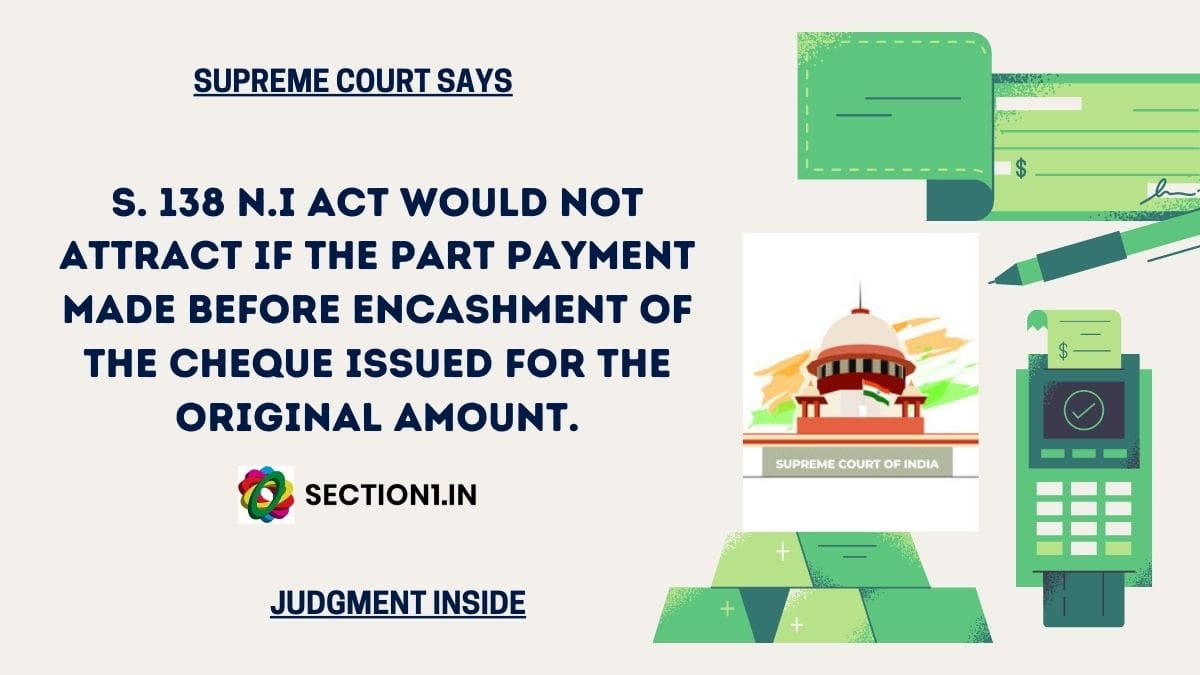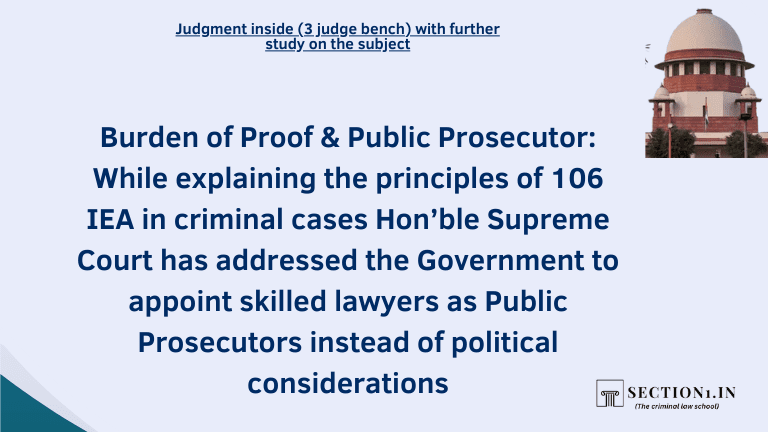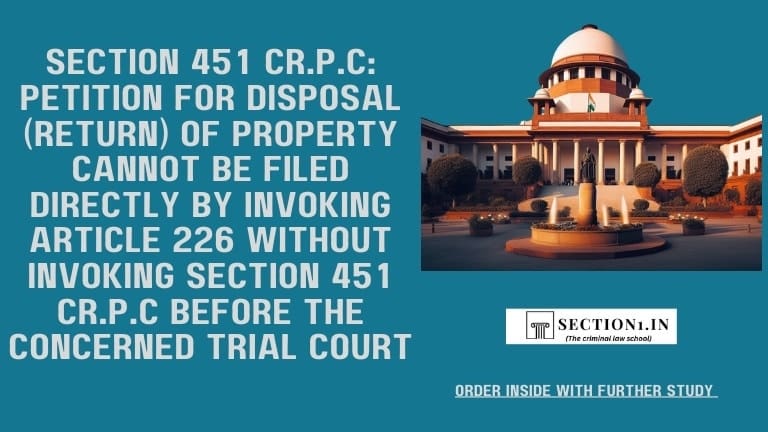- This appeal arises from a judgment dated 12 January 2022 of the High Court of Gujarat. The High Court dismissed an appeal against the judgment of the Additional Chief Judicial Magistrate dated 30 August 2016 by which the first respondent was acquitted of the offence under Section 138 of the Negotiable Instruments Act 1881. At the core, the issue is whether the offence under Section 138 of the Act would deem to be committed if the cheque that is dishonoured does not represent the enforceable debt at the time of encashment.
section 138
- Section 138 of the Act provides that a drawer of a cheque is deemed to have committed the offence if the following ingredients are fulfilled:
(i) A cheque drawn for the payment of any amount of money to another person;
(ii) The cheque is drawn for the discharge of the ‘whole or part’ of any debt or other liability. ‘Debt or other liability’ means legally enforceable debt or other liability; and
(iii) The cheque is returned by the bank unpaid because of insufficient funds.
However, unless the stipulations in the proviso are fulfilled the offence is not deemed to be committed. The conditions in the proviso are as follows:
(i) The cheque must be presented in the bank within six months from the date on which it was drawn or within the period of its validity;
(ii) The holder of the cheque must make a demand for the payment of the ‘said amount of money’ by giving a notice in writing to the drawer of the cheque within thirty days from the receipt of the notice from the bank that the cheque was returned dishonoured; and
(iii) The holder of the cheque fails to make the payment of the ‘said amount of money’ within fifteen days from the receipt of the notice.
Primary issue raised
- The primary contention of the first respondent is that the offence under Section 138 was not committed since the amount that was payable to the appellant, as on the date the cheque was presented for encashment, was less than the amount that was represented in the cheque. The question before this Court is whether Section 138 of the Act would still be attracted when the drawer of the cheque makes a part payment towards the debt or liability after the cheque is drawn but before the cheque is encashed, for the dishonour of the cheque which represents the full sum.
If part-payment is made after issuance of a cheque then the legally enforceable debt at the encashment is less than the sum represented in the cheque
- It must be noted that when a part-payment is made after the issuance of a post-dated cheque, the legally enforceable debt at the time of encashment is less than the sum represented in the cheque. A part-payment or a full payment may have been made between the date when the debt has accrued to the date when the cheque is sought to be encashed. Thus, it is crucial that we refer to the law laid down by this Court on the issuance of post-dated cheques and cheques issued for the purpose of security. In Indus Airways Private Limited v. Magnum Aviation Private Limited [(2014) 12 SCC 539], the issue before a two-Judge Bench of this Court was whether dishonour of post-dated cheques which were issued by the purchasers towards ‘advance payment’ would be covered by Section 138 of the Act if the purchase order was cancelled subsequently. It was held that Section 138 would only be applicable where there is a legally enforceable debt subsisting on the date when the cheque is drawn. In Sampelly Satyanarayana Rao v. Indian Renewable Energy Development Agency Limited [(2016) 10 SCC 458], the respondent advanced a loan for setting up a power project and post-dated cheques were given for security. The cheques were dishonoured and a complaint was instituted under Section 138. Distinguishing Indus Airways (supra), it was held that the test for the application of Section 138 is whether there was a legally enforceable debt on the date mentioned in the cheque. It was held that if the answer is in the affirmative, then the provisions of Section 138 would be attracted. In Sripati Singh v. State of Jharkand4 , this Court observed that if a cheque is issued as security and if the debt is not repaid in any other form before the due date or if there is no understanding or agreement between the parties to defer the repayment, the cheque would mature for presentation.
Security cheques are mature for presentation
Based on the above analysis of precedent, the following principles emerge:
(i) Where the borrower agrees to repay the loan within a specified timeline and issues a cheque for security but defaults in repaying the loan within the timeline, the cheque matures for presentation. When the cheque is sought to be encashed by the debtor and is dishonoured, Section 138 of the Act will be attracted;
(ii) However, the cardinal rule when a cheque is issued for security is that between the date on which the cheque is drawn to the date on which the cheque matures, the loan could be repaid through any other mode. It is only where the loan is not repaid through any other mode within the due date that the cheque would mature for presentation; and
(iii) If the loan has been discharged before the due date or if there is an ‘altered situation’, then the cheque shall not be presented for encashment.
- In Sunil Todi v. State of Gujarat [Criminal Appeal No. 1446 of 2021], a two judge Bench of this Court expounded the meaning of the phrase ‘debt or other liability’. It was observed that the phrase takes within its meaning a ‘sum of money promised to be paid on a future day by reason of a present obligation’. The court observed that a post-dated cheque issued after the debt was incurred would be covered within the meaning of ‘debt’. The court held that Section 138 would also include cases where the debt is incurred after the cheque is drawn but before it is presented for encashment.
Value of post dated cheque
- The judgments of this Court on post-dated cheques when read with the purpose of Section 138 indicate that an offence under the provision arises if the cheque represents a legally enforceable debt on the date of maturity. The offence under Section 138 is tipped by the dishonour of the cheque when it is sought to be encashed. Though a post- dated cheque might be drawn to represent a legally enforceable debt at the time of its drawing, for the offence to be attracted, the cheque must represent a legally enforceable debt at the time of encashment. If there has been a material change in the circumstance such that the sum in the cheque does not represent a legally enforceable debt at the time of maturity or encashment, then the offence under Section 138 is not made out.
-
Section 138 creates a deeming offence. The provisos prescribe stipulations to safeguard the drawer of the cheque by providing them the opportunity of responding to the notice and an opportunity to repay the cheque amount. The conditions stipulated in the provisos need to be fulfilled in addition to the ingredients in the main provision of Section 138. It has already been concluded above that the offence under Section 138 arises only when a cheque that represents a part or whole of the legally enforceable debt at the time of encashment is returned by the bank unpaid. Since the cheque did not represent the legally enforceable debt at the time of encashment, the offence under Section 138 is not made out.
-
The appellant contends that the purpose of Section 138 of the Act would be defeated if the dishonour of the cheque issued for security is not included within the purview of Section 138 where the payment of a part of the cheque amount is made. It was contended that it would lead to a possibility where the drawer of the cheque could evade prosecution under Section 138 by paying a small amount of the debt while defaulting on the remaining payment. Section 56 stipulates that if there is an endorsement on a negotiable instrument that a part of the sum mentioned in the cheque has been paid, then the instrument may be negotiated for the balance. Section 56 reads as follows:
“56. Indorsement for part of sum due.- No writing on a negotiable instrument is valid for the purpose of negotiation if such writing purports to transfer only a part of the amount appearing to be due on the instrument; but where such amount has been partly paid a note to that effect may be indorsed on the instrument, which may then be negotiated for the balance.”
- Section 15 defines the phrase ‘indorsement’ as follows:
“15. Indorsement.- When a maker or holder of a negotiable instrument signs the same, otherwise than as such maker, for the purpose of negotiation, on the back or face thereof or on a slip of paper annexed thereto, or so signs for the same purpose a stamped paper intended to be completed as a negotiable instrument, he is said to indorse the same, and is called the “indorse”.
-
Under Section 56 read with Section 15 of the Act, an endorsement may be made by recording the part-payment of the debt in the cheque or in a note appended to the cheque. When such an endorsement is made, the instrument could still be used to negotiate the balance amount. If the endorsed cheque when presented for encashment of the balance amount is dishonoured, then the drawee can take recourse to the provisions of Section 138. Thus, when a part- payment of the debt is made after the cheque was drawn but before the cheque is encashed, such payment must be endorsed on the cheque under Section 56 of the Act. The cheque cannot be presented for encashment without recording the part payment. If the unendorsed cheque is dishonoured on presentation, the offence under Section 138 would not be attracted since the cheque does not represent a legally enforceable debt at the time of encashment.
-
In view of the discussion above, we summarise our findings below:
(i) For the commission of an offence under Section 138, the cheque that is dishonoured must represent a legally enforceable debt on the date of maturity or presentation;
(ii) If the drawer of the cheque pays a part or whole of the sum between the period when the cheque is drawn and when it is encashed upon maturity, then the legally enforceable debt on the date of maturity would not be the sum represented on the cheque;
(iii) When a part or whole of the sum represented on the cheque is paid by the drawer of the cheque, it must be endorsed on the cheque as prescribed in Section 56 of the Act. The cheque endorsed with the payment made may be used to negotiate the balance, if any. If the cheque that is endorsed is dishonoured when it is sought to be encashed upon maturity, then the offence under Section 138 will stand attracted;
(iv) The first respondent has made part-payments after the debt was incurred and before the cheque was encashed upon maturity. The sum of rupees twenty lakhs represented on the cheque was not the ‘legally enforceable debt’ on the date of maturity. Thus, the first respondent cannot be deemed to have committed an offence under Section 138 of the Act when the cheque was dishonoured for insufficient funds; and
(v) The notice demanding the payment of the ‘said amount of money’ has been interpreted by judgments of this Court to mean the cheque amount. The conditions stipulated in the provisos to Section 138 need to be fulfilled in addition to the ingredients in the substantive part of Section 138. Since in this case, the first respondent has not committed an offence under Section 138, the validity of the form of the notice need not be decided.
Party
Dashrathbhai Trikambhai Patel vs. Hitesh Mahendrabhai Patel & Anr. – Criminal Appeal No. 1497 of 2022 – October 11, 2022.
https://main.sci.gov.in/supremecourt/2022/12508/12508_2022_2_1501_38899_Judgement_11-Oct-2022.pdf






